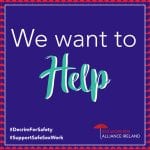
Aoife Bloom, sex worker and spokesperson for the Sex Workers Alliance Ireland (SWAI) says “This report highlights how the Nordic Model of client criminalisation has failed. The law was brought in with great fanfare as it sought to end the exploitation of people in the sex industry by ending demand. Since then victim identification has fallen and anecdotally we know that Garda intelligence on trafficking for the purposes of sexual exploitation has decreased since the introduction of this law. Violence against sex workers has also increased by 92% in that time.
“The Trafficking in Persons report and experts acknowledge that Direct Provision is unsuitable accommodation for trafficking victims, which is a tacit acknowledgement that Direct Provision can compound trauma and is not fit for purpose. We support the Movement for Asylum Seekers (MASI) and other organisations’ calls to End Direct Provision.
“We welcomed the news earlier this year on the introduction of the National Referral mechanism and we anticipate the inclusion of NGOs who do not conflate all sex work with sex trafficking. We also support the report’s call for an exemption for crimes committed while trafficked, as we know in Northern Ireland a woman was convicted of trafficking while being a victim of trafficking herself, and migrants have been prosecuted for working in cannabis grow houses while being labour trafficked.
“The government didn’t initiate any prosecutions for labour trafficking in 2020 but has spent significant money on ‘Awareness-raising’ schemes. The fishing industry has been highlighted as a site of exploitation by NGO’s working with migrants yet no trafficking victims were identified in 2020.”
“Sex workers have not been included as part of Ireland’s anti-trafficking forum. Sex workers and sex worker-led organisations need to be recognised as a vital part of anti-trafficking efforts. Unfortunately, Ireland’s anti-trafficking efforts intersect with our repressive laws which seek to prohibit all sex work. This conflation of sex work and sex trafficking makes sex workers more vulnerable to exploitation and violence by pushing their livelihood underground, it also diverts resources away from fighting trafficking and prolongs the suffering and exploitation of trafficking victims. In fact, these laws have focused almost exclusively on young migrant sex workers working together for safety.
“Sex workers can be an ally in anti-trafficking efforts but we are unutilised and over-policed, making more difficult for us to report exploitation.
“Sex trafficking is a complex and abhorrent crime and the solutions to trafficking in Ireland lie in prevention. Oppressive border controls and lack of legal migration avenues, as well as poverty and addiction increase trafficking. SWAI also calls for a firewall between immigration and other parts of the justice system so that undocumented people who have been exploited, assaulted or raped do not fear deportation.
“Sex work must be recognised as work so that sex workers can enjoy the same labour rights as other workers. In other sectors, strong unions and proper reporting mechanisms have a role to play in ending exploitation. But as sex workers operate in a partially criminalised environment we cannot organise like other workers. Separating out sex trafficking from other forms of trafficking has created laws that make us more vulnerable.
“SWAI continues our call to decriminalise sex work to ensure the health and safety of consensual sex workers and those exploited in the sex industry. The focus on clients and sex workers working together for safety does nothing to combat trafficking. Decriminalisation of sex work will not decriminalise trafficking but will allow sex workers to report exploitation without fear.”
